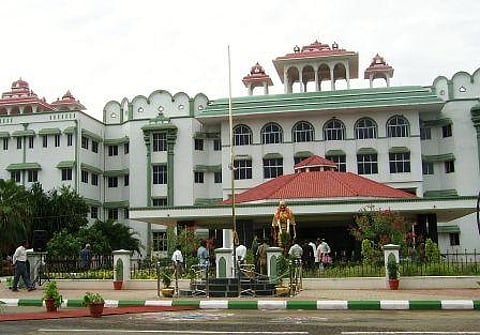

Follow TNM’s WhatsApp channel for news updates and story links.
The Madurai Bench of the Madras High Court, on Tuesday, June 25, delivered a split verdict on a batch of writ petitions filed over animal sacrifice and naming disputes at the Thiruparankundram Hill in Madurai, which houses both the Arulmigu Subramaniya Swamy Temple and the Sikandar Badhusha Avuliya Dargah. Justices J Nisha Banu and S Srimathy differed on the legality of continuing animal sacrifices at the Dargah and the broader implications on religious harmony and legality. While Justice J Nisha Banu refused to prohibit animal sacrifice at the Dargah because it was part of an established religious tradition, Justice S Srimathy said the practice had no proven historical basis and must be prohibited.
Delivering her opinion, Justice Nisha Banu dismissed all six petitions and upheld the status quo, stating: “Since the matter has attained finality during the earlier years of the past century, this Court is not inclined to interfere… with a view to preserve interfaith peace and amity, safeguarding secular coexistence and also to uphold the spirit of religious tolerance and unity among the people of the State.”
The case stems from a series of writ petitions filed by Hindu, Muslim, and Jain groups concerning rights, access, and religious practices at the Thiruparankundram Hill — a site of shared religious significance in Madurai. Petitioners included members of the Hindu Makkal Katchi, who sought a ban on animal sacrifice and congregational prayers at the Sikandar Badhusha Dargah, and the Jain Mutt at Mel Sithammur, which demanded that the hill be renamed Samanar Kundru, citing its ancient Jain heritage.
Justice Banu stressed that the civil courts had conclusively adjudicated the rights of both the Hindu temple and the Dargah in 1920, later upheld by the Privy Council in 1931. Referring to the judgment, she noted: “On the whole, their Lordships are of opinion that the appellant has shown that the unoccupied portion of the hill has been in the possession of the temple from time immemorial… and that the conclusion come to by the Subordinate Judge was right.”
Justice Banu cited the Peace Committee report dated January 30, 2025, stating that ritual animal sacrifice was not a new phenomenon, “It is evident that animal sacrifice in the Dargah located at Thiruparankundram Hills has been prevalent as a religious practice from time immemorial, practiced not only by Muslims but also by other communities as well.”
She added, “Given that ritual animal sacrifices are traditionally performed in multiple Hindu temples across the Madurai region, a blanket prohibition would amount to discriminatory enforcement.”
“The Tamil Nadu Animals and Birds Sacrifices Prohibition Act, 1950 was repealed in 2004 by Tamil Nadu Act 20 of 2004. As on date, there is no statutory bar against the traditional practice of animal sacrifice at religious places in Tamil Nadu,” she further said.
Justice Banu also addressed concerns about religious encroachment, “The Dargah is located on the southern side peak of the Thirupparankundram Hill, while the Subramaniya Swamy Temple and Kasi Viswanathar Temple are situated at different locations. Thus, no religious practices of one community impinge upon the sacred spaces of another.”
However, Justice S Srimathy dissented, stating there was no conclusive evidence to prove animal sacrifices at the Dargah were practiced from time immemorial, “The Dargah had not produced any evidence. If there had been such a practice, it would have been recorded.”
Justice Srimathy observed that communal peace could be disturbed by unverified rituals and said, “The pamphlets calling for slaughter of goats and chicken in the Dargah are mischievous and malicious.”
She directed the Dargah to approach the civil court to establish the legality of the animal sacrifice practice and allowed the Hindu Makkal Katchi’s petition seeking prohibition.
While both judges agreed that the hill’s name should not be changed, Justice Srimathy was explicit, “The hill shall continue to be called Thiruparankundram hill alone. It shall not be called Sikandar Malai or Samanar Kundru.”
She further ruled, “Quarrying of the hill shall be prohibited… Electricity connection is not necessary since no one is allowed after 6 p.m. to Kasi Viswanathar Temple and Sikandar Dargah. Road, drinking water supply and toilets shall not be granted, as it would damage the hill.”
The court acknowledged the protected status of the hill. According to submissions from the Archaeological Department, the entire hillock of 172.7 acres was declared protected under notifications issued in 1908 and 1923, and the Ancient Monuments and Archaeological Sites and Remains Act, 1958 now applies.
Justice Banu also observed, “The Civil Court has recognised the rights of both the parties with regard to the places of the worship in the Hills and also has defined the rights… therefore, there is no issue regarding the location of the places of worship, the associated revenue or the right of access belonging to both the religions in Thiruparankundram Hill.”
Petitions also sought civic amenities like road access, lighting, and drinking water for pilgrims to both the temple and the Dargah. Meanwhile, the trustees of the Dargah moved the court to restrain police from interfering with their religious practices and day-to-day administration.
According to the court record, petitions were filed both in favour of preserving existing Dargah practices and against them. The petitions included those from Hindu groups objecting to religious activities like animal sacrifice and naming of the hill, and others seeking basic amenities for pilgrims visiting the Dargah and the temple. The court also heard from the Archaeological Survey of India, which cited damage to a protected Jain monument near the Dargah and obstruction by local authorities to drone-based site documentation.
Given the disagreement between the two judges, the matter has now been referred to the Chief Justice of the Madras High Court for nominating a third judge.